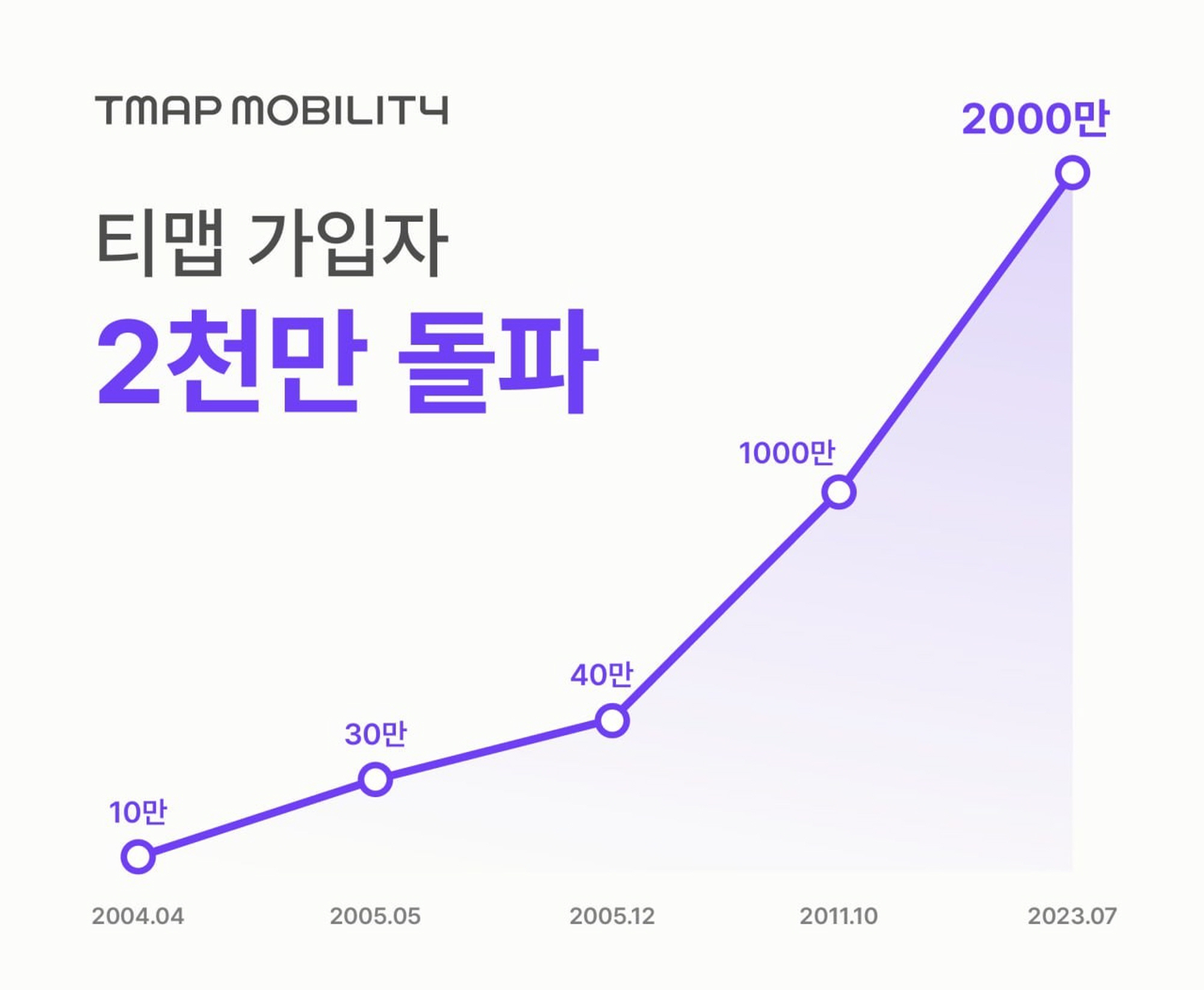
TMAP Mobility announced on the 17th that the number of TMAP subscribers has surpassed 20 million, 22 years after the service’s launch. This growth marks a significant evolution from a simple navigation service to a comprehensive mobility platform. The value contributed to society through quick route guidance and driving habits has amounted to 657.2 billion won in the past five years, while the carbon reductions recorded over eight years have reached 8,885,726 tons.
TMAP was conceived in 2002 under the idea of Chey Tae-won, the chairman of SK Group, and initially emerged under the name ‘Nate Drive’ during the feature phone era. It began collecting and analyzing real-time traffic data via mobile networks and GPS (Global Positioning System), providing the fastest route to a destination through voice and text. This was earlier than the first commercial mobile map service launched in the US in 2005.
In the early days of TMAP, the service was exclusively available to SK Telecom subscribers. However, in the latter half of 2011, it was made accessible to subscribers of other carriers through a fee, and by 2016, it had transitioned to a completely free service for all citizens.
As the number of subscribers increased, the amount of traffic information data also grew, allowing for more accurate route guidance, cementing its status as the nation’s platform. As of 2023, TMAP boasts approximately 11 million SK Telecom subscribers, 4.38 million KT subscribers, 3.86 million LG Uplus subscribers, and around 780,000 subscribers from other (MVNO) services.
During its growth from inception to a free service as the ‘National Navigation’, TMAP’s offerings were consistently upgraded. It evolved from a basic ‘turn-by-turn’ direction with arrows to a ‘full map’ view, and starting in 2013, it began predicting arrival times through big data analysis and pattern recognition. Following that, in 2016, it launched a service that analyzes driving patterns using driver data and utilized SK Telecom’s AI platform, ‘NUGU’, as well as vehicle-to-everything communications.
Moreover, since its rebranding as TMAP Mobility in December 2020, the company has been leading digitalization across various fields including ride-hailing, airport buses, parking, electric vehicles, and freight, aiming to reduce societal costs and innovate in mobility.
TMAP Mobility stated, “Over the past 22 years, we have invested approximately 1 trillion won in the development and maintenance of the TMAP platform, and it would not have been easy for anyone else without the philosophy of social value that SK upholds.”
In accordance with SK Group’s management philosophy, TMAP has actively engaged in ESG (Environmental, Social, and Governance) practices. By providing quick route guidance, it has helped minimize the time drivers spend wandering, while promoting safe driving by reducing speeding, abrupt accelerations, and harsh braking, which has contributed to lowering accident rates.
The social value generated in the past five years has been quantitatively valued at 657.2 billion won (number of safe driving policy subscribers x accident reduction rate x traffic accident compensation costs), and the reduction in greenhouse gas (CO2) emissions has reached 8,885,726 tons over eight years (based on driving habits and optimal route emissions).
Considering that one hectare of a 30-year-old pine forest absorbs approximately 10.8 tons of carbon dioxide annually, the impact is comparable to creating a pine forest spanning 822,752 hectares (8227.52 km²). This amount exceeds the carbon absorbed by a 30-year-old pine forest approximately 1828 times bigger than Yeouido (4.5 km²).
The company is also set to pilot an ‘eco-route’ (tentative name) for electric vehicles, which guides drivers along low-carbon paths based on its self-established ADAS (Advanced Driving Assistance System) maps. The eco-route will be another route guidance option for environmentally conscious drivers that will not only provide traffic information and driving distances but also consider various road environments such as inclines and curves documented in the ADAS map to suggest routes with the least carbon emissions. It’s anticipated to be available starting in the latter half of this year, following current offerings like TMAP recommendations, minimum time, toll-free routes, and shortest distance.
Lee Jong-ho, CEO of TMAP Mobility, emphasized, “For mobility companies to achieve sustainable progress, the leadership in ESG management and carbon neutrality is essential during the era of eco-friendly mobility. We will integrate existing transport modes such as airport buses, public transportation, taxis, and the upcoming services of autonomous driving and Urban Air Mobility (UAM) to innovate mobility and develop into a platform that can be used by everyone, beyond just the ‘National Navigation’.”
Lee Sang-jin daedusj@autodiary.kr
